
41 minute read
mile walking challenge attracts TV attention
The Knowledge that touches the lives of thousands of animals

[THE SPECIAL BOND between a pet and its owner is the source of love, companionship and memories to last a lifetime. So when pets fall sick, owners put their trust in vets and vet nurses to give their loved ones the best possible care. Thousands of those vets and vet nurses put their trust in RCVS Knowledge to help them save the lives of countless dogs, cats and other beloved family friends, and nurse them back to health.
At RCVS Knowledge, they provide veterinary professionals with support and skills that help them give the highest quality of care possible to a wide range of animals, from pet newborn rabbits to the youngest lambs on the farm.
RCVS Knowledge find the answers to urgent clinical questions from veterinary surgeons, and share these for free with veterinary professionals in 150 countries, to help improve the lives of animals around the world.
They provide vets and vet nurses with free checklists, guidelines, articles, podcasts and many more resources that can make the difference between losing and saving a pet. Their team of experts provide veterinary professionals with friendly support every step of the way in finding and using techniques that are proven to give the animals in their care the best chance of a full and lasting recovery.
RCVS Knowledge deliver a wide variety of free training and resources online and around the country, so that busy veterinary professionals can gain the knowledge and confidence they need at a place and time that suits them, whether they are working alone in a rural location or providing out-of-hours emergency treatment.
“We are committed to ensuring as many vets and vet nurses as possible have the best available information to hand when they are making critical decisions about the treatment animals receive,” said Chris Gush, executive director of RCVS Knowledge.
“To do this, we offer a set of services for free, services that are highly regarded and heavily used,” he continued. “Vets and vet nurses tell us time and again how valuable and impressive they find our range of support, which is always delivered in a timely and approachable manner. Many veterinary professionals who draw on our support spread the word to their colleagues and contacts, helping us help even more pets. Our services can help vets to save time, resources and, ultimately, the lives of thousands of animals.
“As a small charity with a big responsibility, we rely on donations to help us carry out our mission to improve the quality of care animals receive,” said Chris. “We need the support of others who share this passion to expand the tools and training we provide, and make sure that as many pets as possible can benefit from our work, which can truly be life-saving.”
If you are an animal owner or veterinary professional, the work RCVS Knowledge does matters to you. They would be grateful if you would consider supporting them, and help them make an impact on millions of animals’ lives long into the future. q • To find out more and how to support RCVS Knowledge visit rcvsknowledge.org/support-us/


Sending out an SOS for the owls
[ESTABLISHED IN 2001, the Suffolk Owl Sanctuary – known, appropriately, as S.O.S. – operates a comprehensive facility for the rescue, care and rehabilitation of owls across EastAnglia. It also promotes the need for the conservation of endangered owl species throughout the UK and beyond with its Saving Britain's Owls initiative.
The S.O.S. owl and raptor hospital at Stonham Aspal is unique in the region. It is specially equipped for the care and treatment of the many injured wild owls and other birds of prey that are brought there every year. The reasons for their being there include road traffic accidents, mishap, starvation, trauma, disease, poisoning and sometimes even shooting or trapping.
Many of the birds can be given a recuperative, short-term pick-me-up before being re-released into the wild. Those that are more seriously injured but stand a chance of recovery are given medical aid and/or surgery, as determined by their vet. The birds are then allowed space and time to fully recuperate in one of the secluded recovery aviaries, before being carefully returned to the wild.
S.O.S. also operates a wild owl nest box scheme, in conjunction with volunteers from the Thornham Owl Project. That includes building and locating long-lasting, environmentally-friendly nest boxes in appropriate locations, to replace the gradual erosion of natural nesting sites. It also involves the careful monitoring of nesting activity within the scheme, for the annual reporting of raptor population information to regulatory authorities.
S.O.S. is funded purely by donation, and like many small charities faces an on-going, uphill struggle as they strive to survive. q
Legacies – the gift of life
[ANIMAL CHARITY Wild Futures rescues and offers sanctuary to monkeys who have suffered abuse and neglect. They are dedicated to protecting primates and their habitats worldwide – primates are endangered due to climate change, habitat destruction and the bush-meat and pet trades.
For some species, it is too late. The future of all that remains lies in our hands, so leaving a legacy to Wild Futures is the gift of life and a future for primates and our wonderful planet.
Wild Futures’ holistic approach makes them unique – providing sanctuary to rescued monkeys, supporting projects overseas, campaigning for primate welfare, educating to protect primates worldwide and promoting a sustainability and ethical ethos.
They receive no government funding, so the generosity of those that remember Wild Futures is essential to enable them to continue their work. A legacy can be the gift of a life worth living and a wild and safe future for all. q • For more information call 01503 262532, email giving@wildfutures.org or visit the webiste at www.wildfutures.org.

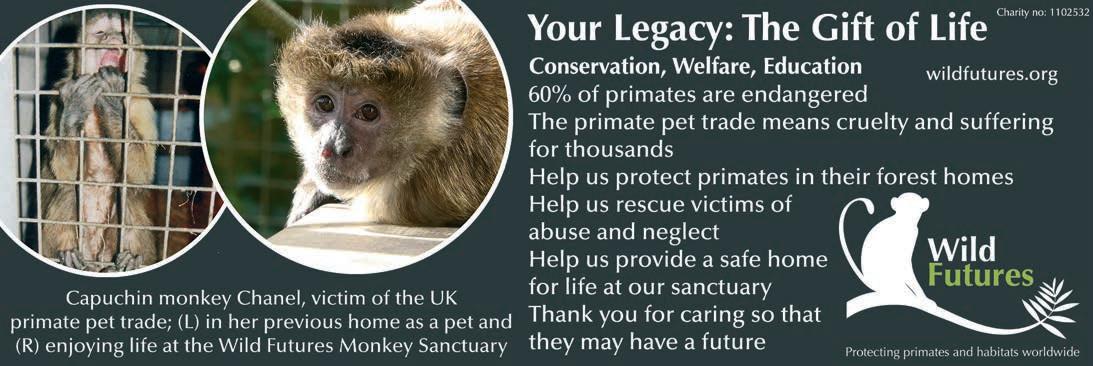
Risk of COVID during lockdown prompts key workers to update wills

[RESEARCH CARRIED OUT on behalf of the Law Society has shown that 7% of respondents made or updated their will during the first UK-wide COVID-19 lockdown, but many have yet to put their affairs in order.
“The coronavirus pandemic has made people reflect on how vital it is to make sure their loved ones are taken care of if they were to die,” said Law Society of England and Wales president David Greene.
A survey by Populus of more than 1,000 members of the public commissioned by the Law Society asked several questions about whether people had made a will. The survey took place in late June last year and the results were published in December.
Over half of those surveyed who were working during the first UK lockdown said they were a key worker: 6% of those who identified as key workers made or updated their will during the first UK lockdown. Key workers were at a higher risk throughout the pandemic and are often more conscious of mortality due to working with those who have COVID-19.
The results showed that well over half (59%) of those surveyed said they did not have a will. Just 29% said they have an up-to-date will which reflects their current intentions.
Given how many people do not have a will, the fact that 7% made or updated their will during that period marks a striking shift.
The main reasons respondents gave for not making a will were not having anything of value to leave to their loved ones (24%), not finding the time to make a will (20%) and thinking they were too young to make a will (18%).
David Greene added: “It is hugely encouraging so many people have made wills during the first UK lockdown, but the fact remains that the overwhelming majority of the UK public do not have an up-to-date will as we enter the second wave of COVID-19 cases.
“In some demographics – such as urban and BAME communities – will-making is particularly uncommon. Only 25% of those from a BAME background had a will, compared to 42% of white respondents. Similarly, only 36% of people in urban areas had a will compared to 54% from rural areas.
“Many people are unaware of the chaos they can leave behind if they do not make a will or regularly update one to reflect their current wishes.
“If someone dies without making a will – also known as dying intestate – the law determines how much of their estate their spouse, children and other relatives will inherit. Under intestacy laws, unmarried partners and close friends cannot inherit, meaning loved ones could be left with nothing.
“Writing a legally valid will with the help of an expert solicitor ensures people’s estates are inherited exactly as they would choose and can prevent a whole raft of problems landing on loved ones when they are grieving.
“The government has also recently introduced temporary legislation to permit remote witnessing for wills so those who cannot make a will in person during the pandemic can ensure their wishes are up to date.
“When writing a will, people should also consider making end-of-life provisions, which determine how they want to be treated medically at the end of their life, and lasting powers of attorney – which grants a trusted friend or family member the right to make financial and welfare decisions on their behalf if they lose mental capacity or become seriously unwell.
“68% of those surveyed did not make lasting powers of attorney or end of life provisions. Many do not know that lasting powers of attorney or end of life provisions can only be made whilst they are deemed to have mental capacity.
“Making these arrangements alongside their will ensures people are able to make these important decisions for themselves – giving them peace of mind during the pandemic and going forwards.” q

Re-homing is their mission
[THE MISSION of Three Counties Dog Rescue is to accept, care for and find homes for unwanted, lost and stray dogs and cats and to ensure their wellbeing afterwards. The charity was founded in 1972 and since then they have improved the lives of over 7,000 dogs and cats.
Before rehoming, all animals are vet checked, neutered, vaccinated, microchipped and kept in suitable conditions. Rehabilitation costs are a major part of the charity’s annual expenditure of over £200,000.
Healthy animals are never put down. As part of that non-destruction policy, several elderly dogs are kept in long term foster care. However, this means that the charity can incur large veterinary costs to maintain a dog’s health while they await a new permanent home.
Every penny raised goes to improving the lives of dogs and cats. Three Counties Dog Rescue is run entirely by voluntary and unpaid helpers, who also meet their own expenses. q
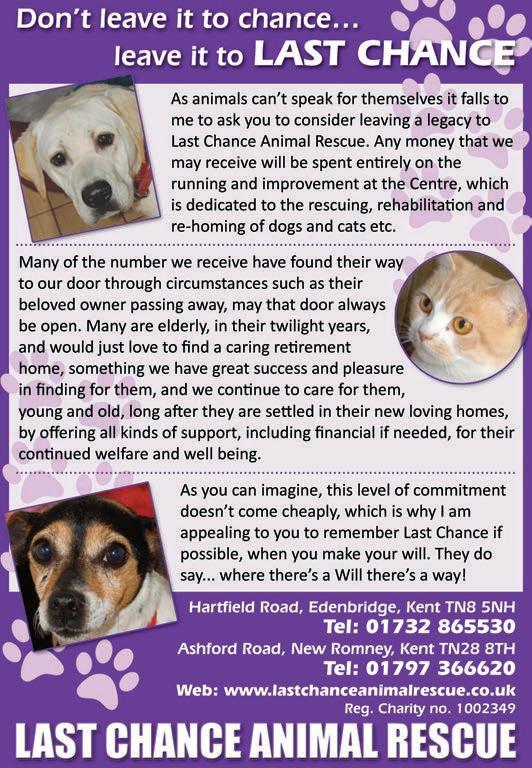

If you Will, we will
[LEGACIES MEAN SO much to the team at Last Chance Animal Rescue. These wonderful gifts have helped them to rescue, rehabilitate and re-home so many abandoned, abused and unwanted dogs, puppies, cats, kittens, rabbits and guinea pigs who otherwise would have had no future.
The charity understand the wishes of its kind benefactors who have considered them in their Wills. A spokesperson said: “We know they want their generous gift to us to be used directly to save lives, provide the very best of care and to find loving homes.
“Legacies really do provide the gift of life and Last Chance Animal Rescue can now, after much planning and prudent use of funds, offer our life saving services to so many more needy pets. We are delighted to announce we now have a second rescue and re-homing centre in Kent, giving hope and a true A new friend for Alan last chance to so many.
“Sadly we cannot thank those who have enabled this wonderful achievement but are extremely grateful to all those who are currently considering helping us now and in the future to continue our work.” q

A small charity with a huge heart
[KIDNEY KIDS SCOTLAND, a very small charity with a huge heart, has for the last 20 years supported Scottish children with renal and urology conditions. The main aim of the charity has always been to enable these children to receive treatment as close to home as possible and minimise disruption to the family unit.
In addition the charity helps hospitals all over Scotland, supplying them with much needed equipment and funding posts recognised as being essential. Chronic Kidney disease is a condition that has no cure and that children and their families must learn to live with.
IMAGINE your child only being able to drink 400mls in one day. That’s less than two cartons of juice – a can of juice is 500mls.
IMAGINE being a parent where you must be home before 8pm every single night to ensure your child gets their daily home dialysis.
IMAGINE not being able to take your family abroad or too far away from the hospital because your child cannot go without their dialysis. This HAS to happen in hospital 3 or 4 times EVERY week.
IMAGINE your child missing out on school education, social activities, family members’ birthday celebrations, a sibling’s sports day or a family wedding because you need to make sure they receive their life saving dialysis treatment.
IMAGINE your child spending their birthday and/or Christmas Day in hospital and not being able to see their friends from week to week. q
IMAGINE LIVING WITH KIDNEY DISEASE
For more information about Kidney Kids Scotland please visit our website at www.kidneykids.org.uk, call 01324 555843 or email office@kidneykids.org.uk Kidney Kids Scotland can help in many ways
Kids Company trial shouldn’t deter would-be trustees
[RESPONDING TO THE DECISION in the High Court on 12 February in the Kids Company trial, the firm that represented five of the defendants, Bates Wells, issued a statement. The High Court ruled against the Official Receiver in his bid to disqualify the former trustees and CEO of Kids Company from acting as directors. In a 225-page judgment Mrs Justice Falk found that the public needed no protection from the ‘highly impressive and dedicated’ trustees and that she was ‘wholly satisfied’ that disqualification was not warranted. In its statement Bates Wells said: “There were no allegations of dishonesty or self-serving conduct, or criticism of spending on any individual child, in spite of the scrutiny which Kids Company’s spending received in the Official Receiver’s investigation and the blaze of publicity which preceded it. Instead the case concerned alleged financial mismanagement, with a central complaint that the defendants caused or allowed Kids Company to operate an unsustainable business model which was underpinned by criticisms of various features of Kids Company’s operations.” The defendants were the former trustees of Kids Company and its founder and CEO, Camila Batmanghelidjh. Although Ms Batmanghelidjh was not appointed as a director, the Official Receiver maintained that she was a de facto director and so liable to disqualification in the same way. With the exception of one former trustee, all the defendants chose to defend the claim, which was heard in the High Court over 10 weeks in the period October to December last year. Bates Wells said: “A trial of charity trustees on these grounds is unprecedented and the message that highly-qualified, diligent and honest charity trustees, doing their best to rescue a charity in difficult circumstances, might be pursued in this way by the Official Receiver has caused much exoneration will give them the assurance they need to take up this rewarding role.” Oakley added that the court’s findings and the judge’s comments should give comfort to lawyers on charity boards that the Official Receiver will think ‘long and hard’ before bringing such proceedings again. q “ ” Our society depends on individuals being prepared to take up trustee roles on an unpaid basis, volunteering their time on top of personal and professional commitments, as the trustees in this case did. disquiet in the sector. “Our society depends on individuals being prepared to take up trustee roles on an unpaid basis, volunteering their time on top Think tank sets out of personal and professional commitments, as the trustees in this case did. “Even though they knew right was on its priorities for new their side, it took great courage to defend proceedings on this scale, pitted against the unlimited resources of the state and exposed to immense financial risk in the commission chair case of a loss. That courage has benefitted the whole charity sector as the defendants’ [WITH THE Charity Commission set to appoint its new chair this year, the charity think total vindication sends a clear message to tank NPD has published a letter it sent to the Department for Digital, Culture, Media and trustees that they will continue to receive the Sport outlining the priorities it thinks the new chair should have. protection of the court when making honest In a release the organisation says: “The appointment of a new chair of the Charity and reasonable judgements under difficult Commission this year presents an opportunity to rethink the commission’s priorities. At circumstances.” a time when the charity sector has proved itself to be a vital partner in the fight against
Speaking of the exoneration of one of COVID-19, the commission should prioritise maximising the impact of the sector.” the trustees, lawyer Jane Tyler, the head of The letter includes the NPD’s belief that the Charity Commission’s trustee obligations dispute resolution at Bates Wells, Robert should be re-written to focus on mission and the impact achieved for the beneficiaries the Oakley, said that, even if a trustee is cleared charity serves. of all wrongdoing, the risk of reputational “Grant-making trusts should be more transparent, publishing both their pay-out ratio and damage from the publicity surrounding their reasoning behind it each year. The Charity Commission’s data needs to be much events may be too high for some. better used and made available in a far timelier manner than at present, and we call for the
“It certainly seems likely that, as a result of Charity Commission to drop the requirement that charities must seek permission before these proceedings, some lawyers may now paying their trustees. We would urge the next chair of the commission to be someone who think twice about becoming a trustee,” said will pursue this agenda.” q Oakley. “We hope, however, that our client’s

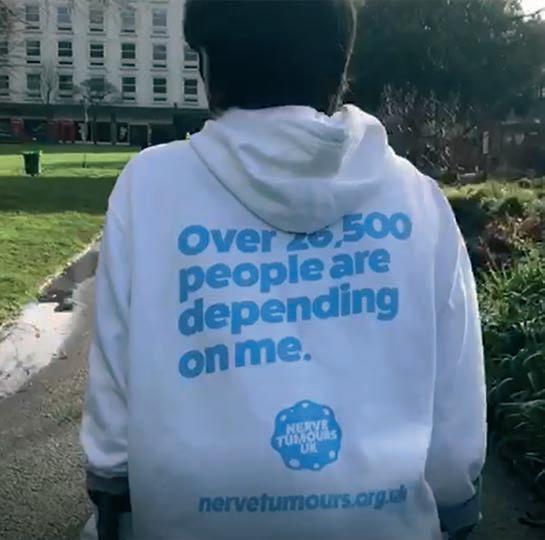

[THE END OF JANUARY saw a young man taking on a 14 miles over 7 days walking challenge in the towns of Southam and Leamington Spa whilst on crutches due to the impact of a rare genetic condition. That young man was Patrick Smith, who lives in Southam. Patrick was diagnosed with Neurofibromatosis Type 2 (NF2) a long time ago. He’s used to facing barriers in life as his NF2 has caused a number of benign tumours to grow across his body, which has unfortunately led to his mobility slowly reducing.
The tumours on his spine and auditory nerves cause difficulty with walking and balance.
Patrick decided to embark upon his own fundraising effort by walking 14 miles over seven days, all while on crutches, to raise funds for Nerve Tumours UK, the charity that helps people with Neurofibromatosis and other connected conditions.
In his own words, he wanted to: “Raise awareness of the challenges people with physical disabilities experience in day-to-day life and so I hope even just a few people recognise that people can be struggling with a lot more than what they show on the surface.” He was spurred to make the Herculean effort during the first coronavirus lockdown. He explained: “I constantly heard people complaining about how they could no longer go out and see friends or go to the pub/clubs and so on. It made me realise that some people do not realise that those with physical difficulties experienced those exact feelings every day before the lockdowns, and I hope to raise awareness of those challenges – as well as raise some funds to help people growing up with the same condition I have had my entire life.”
Patrick’s initial aim was to raise £450 for people who have the same condition. To date he has raised more than £4,000.
Patrick’s friends documented the seven stages of his walk with photos and a video diary. He began in the snow in Southam, accompanied by his mother and sister Hannah. The following days saw him tackle very different challenges in Leamington – from the mud of his local woodland to the uneven terrain of the local park and the steep incline of Leamington Town Parade.
His effort attracted the attention of local BBC TV station BBC Midlands, who interviewed him and showed part of the video of his walk. The story of Patrick’s walk and his interview with BBC Midlands can be viewed at nervetumours.org.uk. q • Nerve Tumours UK provides support and information, as well as campaigns, and raises awareness on behalf of over 26,500 people in the UK who are affected by Neurofibromatosis (NF1 and NF2) and Schwannomatosis. The charity finances a UK wide network of specialist Neurofibromatosis nurses and runs the national helpline to support those affected from first diagnosis throughout their adult life with the aim to make their every day better.
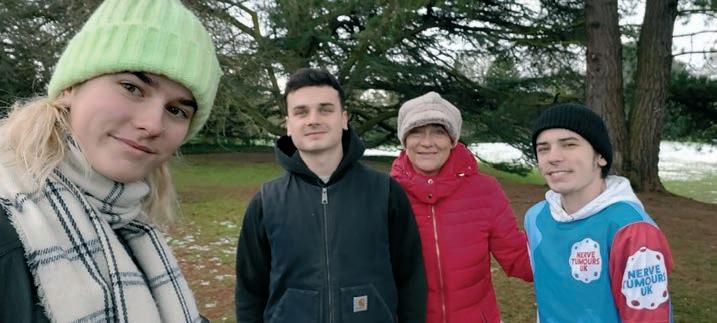
Commission to consult on charities’ investments

[THE CHARITY COMMISSION, the registrar and regulator of charities in England and Wales, is to consult on revised guidance on responsible investments. The term ‘responsible investments’ refers to financial investments that align with a charity’s mission and purpose.
The commission plans to publish draft guidance in the spring for public consultation, supported by a refreshed interpretation of the law in the area. The final, updated responsible investments guidance is expected this summer.
The announcement of the consultation follows a listening exercise undertaken by the regulator last year, which found, among other things, that the way responsible investment is outlined in its current guidance is not giving some trustees sufficient confidence that they can consider, or that the commission supports, that approach to investment.
Reporting on that exercise in November, the commission said: “It is clear from the responses we received that some trustees consider the legal framework itself to be a barrier. There are wide differences in interpretations of the legal framework which clearly breed uncertainty about decisions trustees are legally allowed to make. Some believe the case law is ‘outdated’ and at odds with public expectations of how charities should behave.”
Paul Latham, director of communications and policy at the Charity Commission, said: “It is not for the commission to instruct charities on how to invest their assets. But it is part of our role to ensure our guidance keeps pace with wider changes in society, so that charities feel confident to invest and use their resources effectively in line with their purpose, and be accountable to the public and donors.
“We are grateful to all those who took part in last year’s listening exercise, and we hope that charities, investment managers and others will take the opportunity to offer feedback when we publish draft guidance in the spring.”
The commission’s guidance on responsible investments is part of its wider guidance on Charities and Investment Matters. q
Rescue centre offers a lifeline to injured wildlife

[HESSILHEAD WILDLIFE RESCUE TRUST is situated near Beith, in North Ayrshire. It was set up as a charity in 1986, although its founders Andy and Gay had been caring for injured and orphaned wildlife since 1970, when they rescued a fox cub from a gamekeeper and his dogs. As the number of casualties increased year on year, Andy and Gay needed financial and practical help.
Once the trust was set up, new aviaries and enclosures were built. A membership scheme proved popular and many volunteers were recruited. The centre now occupies a 20-acre site, including woodland, marsh and open water. That gives a variety of release sites for its patients.
Approximately 3,500 wildlife casualties are now treated each year, with the aim of returning them to the wild. Among the many hedgehogs, foxes and familiar garden birds there are deer, otters, badgers and seals. All have been rescued and are rehabilitated. In addition, swans are treated regularly, along with buzzards, peregrines, herons and sea birds.
The centre operates a 24-hour rescue service and there are more than 60 enclosures and aviaries, a hedgehog hospital, a seal/swan unit and intensive care facility. It also offers training courses on the handling, care and treatment of wildlife casualties.
Spring and summer are especially busy, with hundreds of nestling birds being hand reared. Care is taken to rear all youngsters with minimum human contact. That prevents wild birds and mammals becoming too used to people, so giving them a good chance of survival in the wild.
Hessilhead is primarily a voluntary organisation. Its volunteers help in many ways: fundraising, building and maintenance, driving patients to the centre and daily cleaning and feeding. q
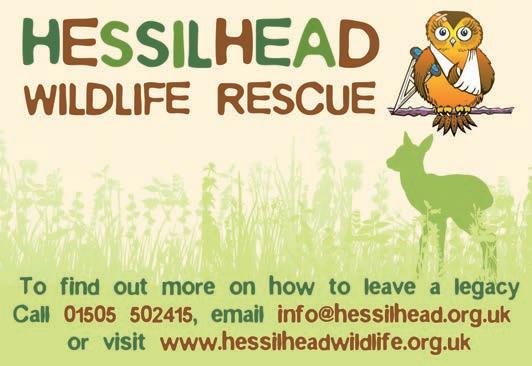

Bates, the dog rescued from the awful trade
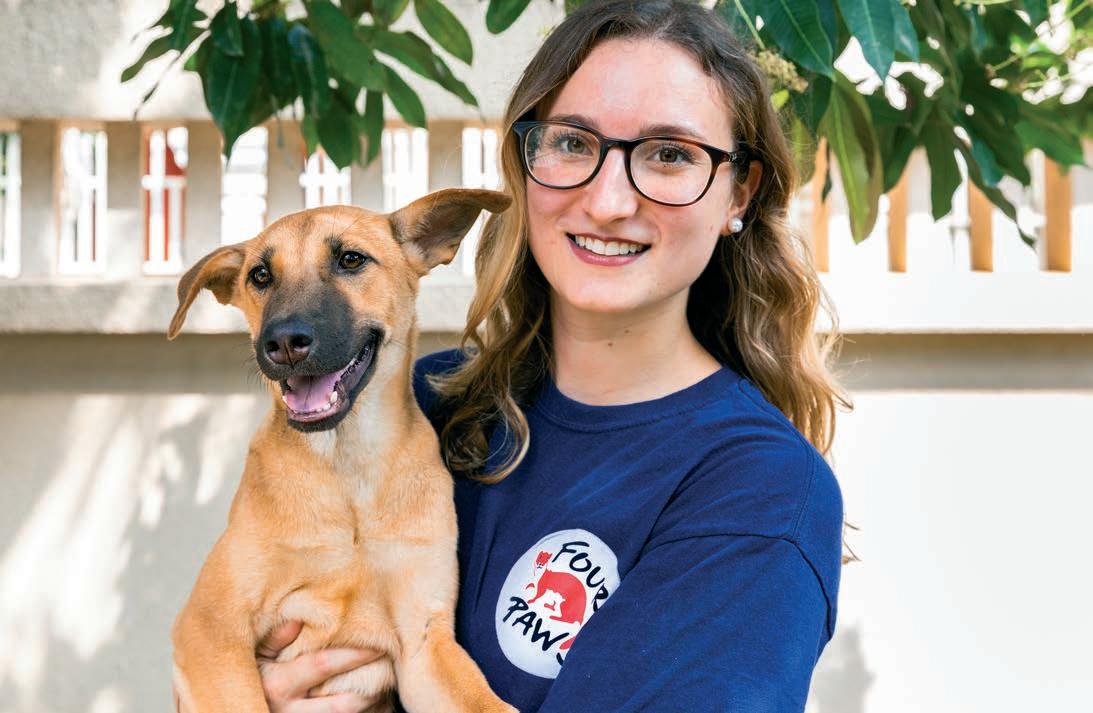
How Bates was rescued from the dog-meat trade
[DOGS AND CATS are being cruelly stolen and brutally killed for the meat trade. That’s the startling revelation by animal welfare charity FOUR PAWS. According to the charity, each year millions of dogs and cats like the ones pictured will be stolen, killed and eaten in South EastAsia. Drowned, electrocuted or beaten to death, the cruelty they will suffer is near unimaginable. Often, they are strays snatched from the streets, or family pets stolen from loving homes.
One such dog – they called him Bates –was desperate to escape his cruel fate at a slaughter farm.
FOUR PAWS found Bates on a rescue mission in Cambodia. He was packed in a cage crammed full with other dogs. The crying and whimpering from those dogs, many of them beloved pets, was truly heart-breaking. In desperation, dogs reached out their paw through the cage bars for help. The charity felt it could not turn away.
FOUR PAWS was able to rescue Bates and he has now been adopted into a loving family with the chance of a new beginning. Sad and emotionally shut down at first, it took time for Bates to recover. He is now learning to trust people again and is happy and energetic. His days are spent playing and enjoying long walks.
Stopping the trade for good
FOUR PAWS is working to save more dogs and cats from this torture and end the trade for good. Since the rescue of Bates, many more dogs and cats have been saved and rehomed, slaughter farms have been closed down together with ground-breaking campaigns which aim to strengthen animal protection laws.
Protecting animals in the future
Founded in Vienna in 1988, the FOUR PAWS vision is of a world where humans treat animals with respect, empathy and understanding. Its mission is to act as a strong, global and independent voice for animals under direct human control.
Gifts in wills have a huge impact on the work FOUR PAWS does, enabling them to continue rescuing and caring for animals. That is why they have partnered with willwriting service Bequeathed, who offer a completely free online will-writing service. It’s something anyone can do from the comfort of their own home without it costing them a penny. q • To make your will without it costing you a penny, please visit bequeathed.org/fourpaws.



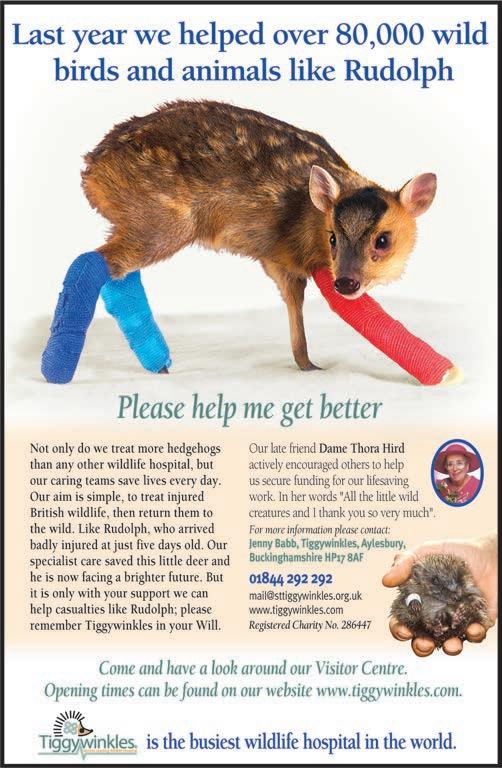
Trust works to save iconic working horses
[THE SUFFOLK PUNCH TRUST is a registered charity, whose aim is to ensure the survival of the famous horse breed. It was founded in 2002 to save the historic Hollesley Bay Colony Stud.
That stud brought a rich legacy of equine and agricultural history which deserves to be saved for future generations to enjoy. The trust aims to achieve that through a successful breeding programme, supported by funding, education and the outreach facility of its visitor centre.
The Suffolk Punch is the oldest English breed of working horse, dating from the 16th century. Every Suffolk horse can be traced back to a stallion, known as Crisp’s Horse of Ufford, foaled in 1768. The Suffolk horse was developed for farm work and gained popularity during the early 20th century. As agriculture became mechanised, however, the numbers fell and the breed almost disappeared completely.
The aim of the trust is to help save the iconic breed from extinction through its established breeding programme. It is working towards increasing the numbers of horses through normal breeding processes and an artificial insemination programme.
It also works to raise public awareness and is training a new generation of professionals to work with and understand the needs of the breed. The Suffolk Punch is incredibly versatile and is now often employed in forestry and ridden work.
The Suffolk Punch Trust can only continue its work with the help of donations and legacies. As David Clarke, one of the trust’s directors, explained: “Your legacy, large or small, will make a huge difference to the work we carry out, enabling us to care for our horses and continue the breeding programme to secure this wonderful breed.” q
Charity carries on the work of its founder
[FOR OVER 30 YEARS the famous animal hospital known as Tiggywinkles has been working to rescue, treat and rehabilitate sick, injured and orphaned British wildlife. Over that time they have proved beyond doubt that most wild animal and bird casualties can be saved and returned to the wild.
Although they specialise in hedgehogs – indeed, they derive their name from St Tiggywinkles, the name of their specialist hedgehog ward, inspired by the animal character created by Beatrix Potter – their wealth of expertise in the care of a wide range of species can now be passed on to others.
In addition, their commitment to practical education plays a vital part in the conservation of wildlife. As an accredited centre, opportunities are available for students aged 16 and over to gain a City and Guildsapproved qualification via their Apprenticeship in Animal Care scheme.
Tiggywinkles was founded by Les Stocker, who sadly passed away in July 2016. In a tribute, Les was described as ‘…a steadfast ambassador, achieving his goal to turn wildlife rehabilitation into a profession’. In another he was referred to as the ‘the spiritual heart of Britain’. He was awarded an MBE by The Queen and given the title Laureate in the 1990 International Rolex Awards for Enterprise, for his work in wildlife conservation and establishing Europe’s first wildlife teaching hospital. More recently, he gained the prestigious Honorary Associateship of the Royal College of Veterinary Surgeons.
The charity is happy to commemorate all who generously remember the Wildlife Hospital Trust in their will by inscribing their name on a plaque in its Remembrance Garden. Gifts are also welcome in the form of a donation or by becoming a Friend of Tiggywinkles. q
Regulator’s report highlights achievements during and pre-COVID
[ON 4 FEBRUARY the Fundraising Regulator published its latest Annual Report and Accounts. The report highlights how the regulator reprioritised its work amid the unprecedented challenges facing the sector from last March onwards.
The reporting period of 1 September 2019 to 31 August 2020 falls six months before and six months after the coronavirus pandemic began. The report explains how, in response to the pandemic, efforts were focused on producing guidance to ensure that both fundraisers and the public could fundraise and donate safely.
The series guidance was produced in collaboration with other sector organisations, such as the Chartered Institute of Fundraising, the Charity Commission for England and Wales, National Trading Standards and Action Fraud, to ensure a joined-up message to all individuals and organisations engaged in fundraising.
The regulator also worked with the Department for Digital, Culture, Media and Sport (DCMS) to ensure guidance for fundraising organisations applied the very latest government advice, to achieve endorsement from the Health and Safety Executive, Public Health England and the Cabinet Office.
In a statement, the regulator says: “Our Annual Report observes how the nature of enquiries we received changed over the period, reflecting that fundraisers were adapting to the restrictions on social contact. We also saw fluctuations in the volume of complaints received across the year, reflecting times when public fundraising methods were paused.”
The regulator’s chair, Lord Toby Harris, commented: “This year our primary focus has, of course, been to help fundraising organisations meet the challenges of the pandemic through guidance and resources. We’ve also made it a priority to ensure the public know what good fundraising looks like.
“It was a year in which we saw true innovation and resilience, as many organisations increased their use of digital fundraising methods and overhauled the way they interacted with donors. Collectively, the sector has responded with agility and willingness to evolve.
“As the Fundraising Regulator enters its fifth year of operation, I believe the sector has made significant strides forward. The evolution in fundraising practice we have seen in just five years is a credit to the progressive nature of the fundraising sector, and proves our regulatory model is working to raise standards.” In its introduction the report says: “As the pandemic began to impact the way organisations fundraised in public, we recognised the need to provide clear advice on fundraising safely. We also understood that members of the public would be feeling anxious about interacting with fundraisers at this time, so it was also our role to provide sufficient reassurance that fundraising would only be carried out if it was done so safely. “To ensure organisations received a clear and consistent message, we provided our guidance jointly with the Chartered Institute of Fundraising.” The report also sets out the work that took place prepandemic, which included some important milestones. They included the implementation of the new Code of Fundraising Practice, which was the most comprehensive overhaul of the code in more than a decade, the maturing of its complaints function, following the publication of the first external review of its casework, and the highest payment rate of the annual levy in the regulator’s history, with 97% of the total collected.
Chief executive Gerald Oppenheim explained: “Despite the challenges presented by the pandemic, our Annual Report demonstrates how the sector has continued to respond positively to our regulatory activity and maintain high standards of fundraising practice. Our achievements throughout the year, such as the launch of the new code and high rate of levy payment, represent our maturity as a regulator and the charity sector’s support of self-regulation.” q

Supporting the maritime community
[SEAFARERS UK is a charity that has been providing vital support to the men and women who work at sea and are in need, and to those in maritime education or training, for over 100 years.
The charity does this by giving grants to organisations and projects that make a real difference to people’s lives. Seafarers UK receives no government funding and is heavily dependent on public donations and legacies. Last year Seafarers UK was able to give £2.2m in funding to over 50 maritime welfare and youth charities. q • To support Seafarers UK or to find out more about their work, visit the website at www.seafarers.uk or email seafarers@seafarers.uk
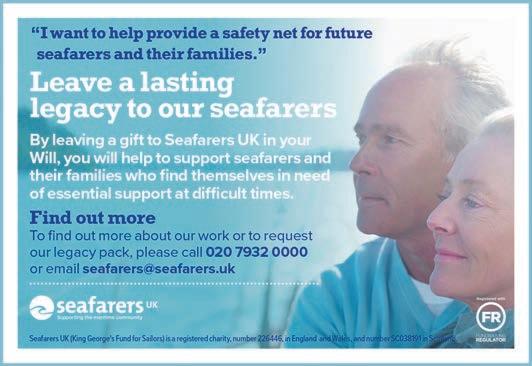
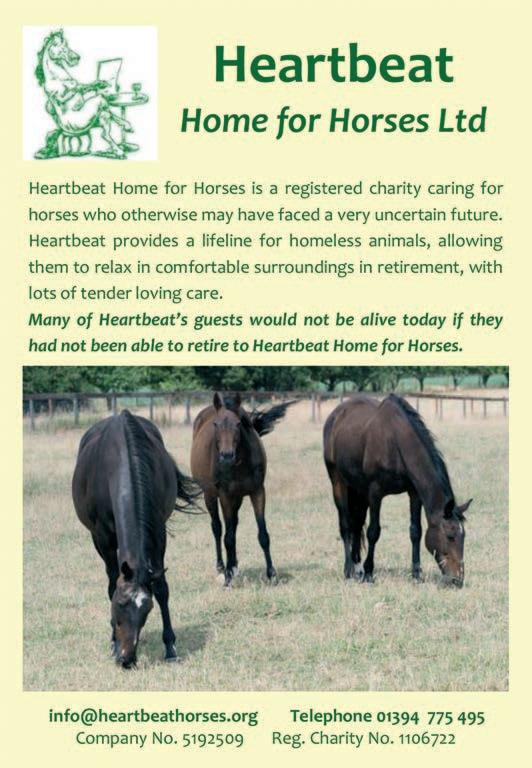

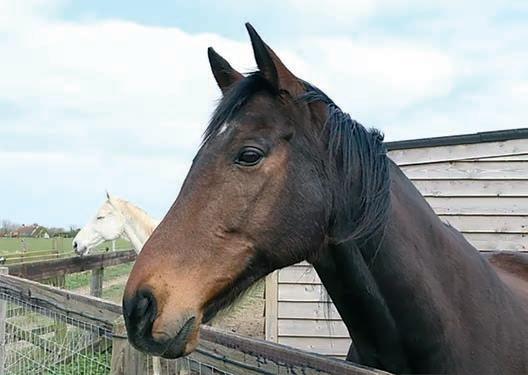
[IN 2019, following the retirement of managing trustee Colin Cooper, some of the Heartbeat horses moved to a new home at Sink Farm in Woodbridge, Suffolk.
Colin was very pleased to announce that the charity’s headquarters had moved to Hollesley where the current horses will live and be cared for alongside the wonderful Suffolk Punch horses.
Sink Farm is the colony stud for the Suffolk Punch Trust charity, who continue their important and essential work in preserving this unique breed. q • For more information on either charity please contact Tracey Pettitt, stud manager or David Clarke, finance director, on 01394 775495. Heartbeat Homes for Horses, Sink Farm, St David’s Lane, Hollesley, Woodbridge, Suffolk IP12 3JR
Giving sighthounds a second chance
[FOREVER HOUNDS TRUST has been rescuing, caring for and homing greyhounds, lurchers and other sighthounds for 25 years.
These beautiful dogs find themselves in the charity’s care for many reasons, but they have one thing in common – they are in desperate need of help to find them a safe and happy home, having been neglected, abused, or finished their career as a racing greyhound.
Forever Hounds Trust are proud to have homed over 10,000 of these marvellous dogs and they rely entirely on supporters, donations, trusts and, vitally, legacies to cover the substantial costs of every dog’s journey from rescue to loving family pet.
The charity’s Susan Kerry Bedell says: “The demand for us to take in dogs continues to grow. By leaving a gift to Forever Hounds Trust in your Will, you are allowing us to rescue, treat and give more dogs a safe future.
“Legacies provide shelter for dogs in our kennels and foster homes. Legacies provide emergency medical care and preventative treatments. Legacies keep our vans on the road to rescue dogs from desperate situations.”
By remembering Forever Hounds Trust in your will, you are helping give more dogs a second chance at a happy life. q • For more information visit the website at www.foreverhoundstrust.org, telephone 03000 125 125 or email legacy@foreverhoundstrust.org

JustGiving publishes resources for virtual fundraisers
[LAST NOVEMBER the charity donation platform JustGiving launched a benchmark report, The Virtual Fundraising Monitor, in collaboration with events agency massive. The report details and analyses the response to a survey carried out over the summer, as charities came to terms with the COVID pandemic and made the most of the virtual world to carry out their activities online.
The research report begins by setting out the information the researchers had to work with.
“We received over 300 responses, with information shared from 150 virtual campaigns delivered since lockdown began. This translates into data from almost 1.8 million donors and participants who have collectively raised more than £60m.
“With lockdown seeing some incredible fundraising feats, such as the £33m raised by Captain Tom’s record-breaking online fundraiser, which could potentially skew our figures, for the most part we have excluded straight donation asks for the purposes of this report, and focused on activities based around peer-to-peer fundraising.”
The report goes on to describe a number of case studies of virtual fundraising events by a number of charities, including Alzheimer’s Society and Edinburgh Children’s Hospital Charity.
Introducing the report on the JustGiving blog, its content marketing specialist and B2B copywriter Toni Gregory wrote: “In 2020 the charity sector witnessed a rush of virtual event fundraising on JustGiving, as charities of all sizes adapted their events plans in response to COVID-19. The Virtual Fundraising Monitor identified key benchmarks for event fundraising to build their virtual events planning around.”
She posed the question whether charities should view the virtual world as an on-going place for fundraising events or should anticipate returning to the old normal as the pandemic’s effects began to fade. The conclusion is that there is no going back.
More than half of the charities in the survey said they plan to launch a virtual event in the next year months. So “…continuing to focus on your digital experiences feels like the right thing to do – both now and when lockdown restrictions ease.”
Toni pointed to the huge diversity of people who took part in virtual events over the course of last year as evidence of how virtual experiences have become the norm. However, she sees the real world as returning to join the mix.
She concludes: “It is very likely that hybrid events – events which bring together a blend of real-world and virtual experiences – will become the new standard for the charity sector and with over 20 years’ experience in digital fundraising we are here to help charities of all shapes and sizes to adapt.”
The report can be downloaded from pages.justgiving.com.
Reviewing the document, Charity Digital’s Aiden Paterson explained why virtual fundraising is here to stay: “This is because supporter behaviour has shifted massively over the last 12 months. Whether it’s taking part in a virtual marathon or chatting to friends on Zoom, COVID-19 has converted a lot of digital sceptics. Charities that continue to invest in virtual events as part of a more holistic events strategy will thrive even once the COVID-19 pandemic begins to have less effect on day-to-day life.”
Paterson went on to review JustGiving’s Virtual Fundraising Event Toolkit, produced by Blackbaud, which outlines the resources available to help charities take advantage of the virtual events environment.
He writes: “The JustGiving Virtual Fundraising Event Toolkit is a six-part guide that walks charities through planning and implementing a successful virtual event. It includes information on timelines, reporting and stewardship. Each section is filled with tips, charity examples, and an end-of-section checklist that you can work through step-by-step.”
In its introduction the toolkit states: “Virtual events come in all formats and sizes, offering charities new and creative ways to engage with supporters, as well as expand their fundraising activities’ reach. Whilst it’s true that the impact of COVID-19 has accelerated the uptake of virtual events, they have been steadily growing in popularity for several years. Our prediction is that virtual events will come to be expected from supporters, even when the pandemic has hopefully become a distant memory, with charities needing to focus on creating hybrid events – events that offer the participants the option of taking place in the real world or online.”
Aiden Paterson concludes: “On JustGiving your charity gets Fundraising Page reports that keep you close to the fundraising activity happening (or not happening) for your event, enabling you to see if someone has made a Fundraising Page and if they’ve started to receive donations. Looking at your report you’ll be able to spot anyone that needs a friendly reminder to start fundraising online and share tips to help them get that all-important first donation.”
The toolkit can be downloaded from pages.justgiving.com. q
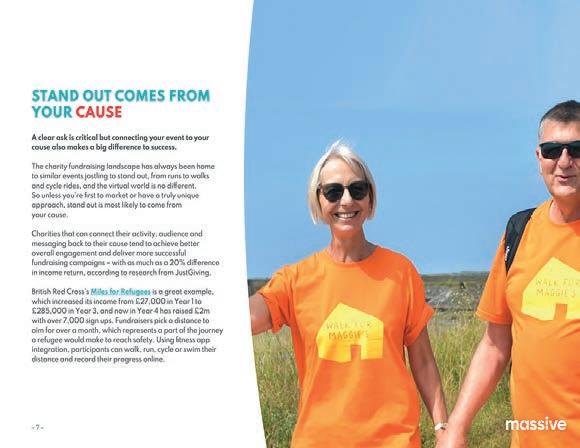


The dream continues to offer sanctuary to abandoned animals
[THE YEAR IS 1983 and it is the coldest winter for 20 years. Many stories about horses and ponies being abandoned by their owners on Rainham Marshes in Essex were hitting the headlines.
Paula Clark, who was involved in raising money for a number of sanctuaries, was sitting at home in tears after reading the story of those poor horses. When her husband Ernie returned home from work, Paula showed him what was happening and they vowed to take action and help the animals that needed them.
Some of the horses were already dead and others were starving when the couple got to the marshes. They weren’t having their basic needs met; they had no water or food. Paula and Ernie took tanks of water to them and bales of hay and feed. They even got a vet to examine some of them. No-one was looking after the horses’ basic needs – let alone enriching their lives.
Paula and Ernie embarked on fulfilling their dream and the story of Hopefield Animal Sanctuary began. They began taking horses with the intention of fostering. They would bring them back to health and then find them nice homes.
The first horse they fostered out was Pye. Soon after they heard that the fosterers were trying to sell him, so Ernie took them to court at a cost of £4,000. Ernie finally got Pye back in a terrible state, so both Paula and Ernie promised they would never rehome again – the animals had a home for life.
As Paula and Ernie found fostering animals didn’t work out they decided to provide homes for life to their animals. One beneficiary is Juliette, a thoroughbred horse who arrived in a terrible condition.


Because of her home for life at Hopefield, and the daily care and attention she receives, she is now physically transformed.
Paula and Ernie have both now sadly passed away. Since their passing the work has been taken over by new trustees and a dedicated team of staff and volunteers look after the resident animals, old and new. Many animals arrive in a terrible condition and are completely transformed by living at the sanctuary.
The sanctuary has now been running for 35 years – it has over 50 regular volunteers, a huge amount of local and loyal support and over 20,000 followers on Facebook.
CEO Dave Schlaich explained: “We have continued to rescue horses and farm animals, but have found that over the years the type of animals we are having to help has greatly changed, with people getting more and more into exotic species through the pet trade.”
The sanctuary is now open to the public from Friday to Monday each week. It has become a visitor attraction with a small tea room. All activities generate funds that go directly to the animals, making the future more secure.
Said David: “You can support us by becoming a regular donor, visit us, sponsor an animal or leave us a legacy in your will, knowing that your donation goes towards providing a home for life for one of our animals.” q
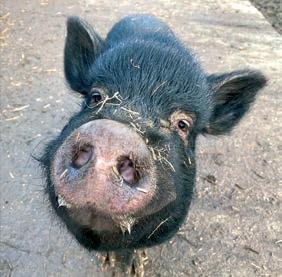
Conference brought everything together again: this time online
[IN MARCH LAST YEAR Charity Digital held its second #BeMoreDigital Conference at Olympia London. They were incredibly lucky: the event took place just days before the UK faced the first wave of social distancing restrictions following COVID-19.
Since then the charity sector has changed dramatically. Dayto-day operations have moved from offices to online platforms, service delivery has become increasingly digitised and fundraising has become almost entirely virtual. Charities have adapted to meet the demands of the ‘new normal’. And Charity Digital adapted, too: the #BeMoreDigital Conference returned for 2021 – and this time it was virtual.
The conference began on 2 March and ended on 4 March. It boasted an impressive line-up over the course of three days, with speakers and guests focussing on four main themes: Digital Marketing; Digital Strategy; Digital Fundraising; and Digital Service Delivery and Operations.
The 20 sessions comprised eight tech-led webinars, nine charity-led webinars and three panel discussions. All the events took place on Zoom, with networking opportunities held on Remo.
Speaking in advance of the event, organisers Charity Digital said: “We hope to reach as many people as possible, so for 2021 the #BeMoreDigital Virtual Conference is completely free. All you need to do is sign-up. You will then be given access to the event hub, where you can add sessions and view your daily itinerary.”
The first day focused on Digital Marketing and Digital Strategy. After an introduction by CEO Jonathan Chevallier, those attending decided on which stream to follow.
The second day, 3 March, was given over to invitation-only workshops and a networking session.
On the third day, 4 March, two more essential streams were on offer. The first was the Digital Fundraising Stream, which explored Legacy giving: the myths, the facts, and everything in between and Your next generation digital fundraising toolbox, while the Digital Service Delivery and Operations Stream covered Is digital working for you, or are you working for digital? and Upscaling your digital service delivery during challenging times.
We are hopeful of being able to bring you a review of the conference in the next issue of The Charity Pages. q






